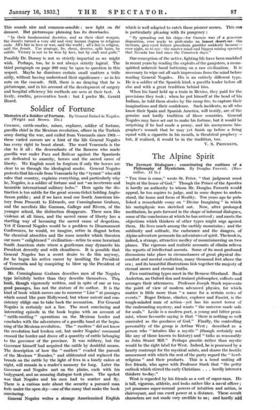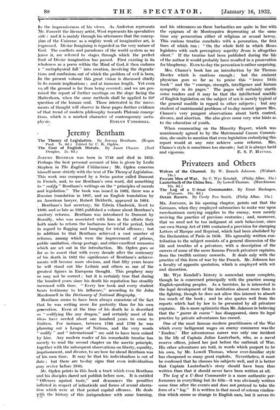The Alpine Spirit
"Tres time is come," wrote St. Peter, "that judgment must begin at the house of God." Though the Prince of the Apostles is hardly an authority to whom Mr. Douglas Fawcett would appeal, he too aspires to judge, and in some degree to under. stand, the home and focus of Reality. Ten years ago he pub. lished a remarkable essay on " Divine Imagining " in which his metaphysic was sketched out. Now, after prolonged meditation, he puts forward in the shape of informal dialogues, some of the conclusions at which he has arrived ; and meets the objections which thinkers of other types might urge against them. He lives much among the earthly mountains ; and the sublimity and solitude, the endurance and the dangers, of Alpine adventure permeate his adventures of spirit. The book is, indeed, a strange, attractive medley of mountaineering on two planes. The vigorous and realistic accounts of climbs relieve the reports of intellectual ascents. Some of its most profound discussions take place in circumstances of great physical dis- comfort and mental exaltation, many thousand feet above the sea ; and its beautiful illustrations link together the majesty of eternal snows and eternal truths.
Five contrasting types meet in the Bernese Oberland. Basil Anderton, an Oxford don and trained philosopher, collects and arranges their utterances. Professor Joseph Stark represents the point of view of modern advanced physics, for which matter is little more than " a name for a certain series of events." Roger Delane, climber, explorer and Fascist, is the tough-minded man of action—yet has his secret terror of the enshrouding mystery, and wants " the universe made safe for souls." Leslie is a modern poet, a young and bitter pessi- mist, whose favourite saying is that "there is nothing so well concealed as the goodness of God." Finally, the controlling personality of the group is Arthur West ; described as a person who " intuites like a mystic " (though certainly not like any of those known to history) and " talks as reasonably as John Stuart Mill." Perhaps gnostic rather than mystic would be the right label for West. Indeed, he is possessed by a hearty contempt for the mystical saints, and shares the hostile amusement with which the rest of the party regard the " herd- religions " and their products. This is a bond uniting all five friends, who agree with Professor Stark that "the petty outlook which stirred the early Christians . . . hardly interests thinkers to-day."
West is regarded by his friends as a sort of super-man. lie is tall, vigorous, athletic, and looks rather like a naval officer ; yet possesses super-normal powers of intuition and action, is clairvoyant, and can exert power at a distance. These occult characters are not made very credible to us ; and hardly add
to the impressiveness of his views. As Anderton represents Mr. Fawcett the literary artist, West represents his speculative side : and it is mainly through his utterances that the concep- tion of the Universe as a mighty work of imaginative art, is 'expressed. Divine Imagining is regarded as the very nature of Cod. The conflicts and paradoxes of the world system as we know it, are referred to stages, through which the perfect fruit of Divine imagination has passed. First existing in its wholeness as a poem within the Mind of God, it then endures
" metaphysical fall " into creation, involving the degrade:- tions and confusions out of which the problem of evil is born, In the present volume this great vision is discussed chiefly in its cosmic implications ; and at immense length. Yet even NO, all the ground is far from being covered ; and we are pro.- raised the report of further meetings on the slope facing the Matterhorn, when the same methods shall be applied to the question of the human soul. Those interested in the ' Move- ments of thought will observe in these pages further evidefiCe of that trend of modern philosophy towards Platonic concep- tions, which is a marked character of contemporary meta-



































 Previous page
Previous page